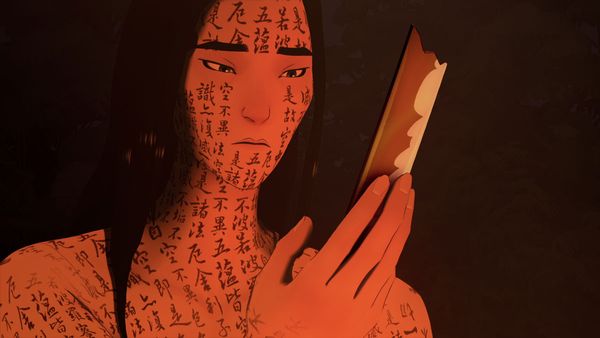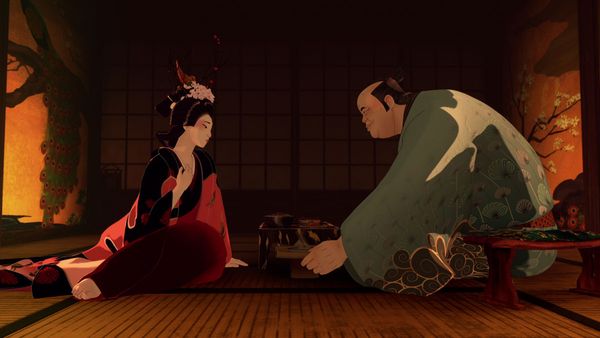
"Blue Eye Samurai" is an action-packed animated samurai series set in Edo-era Japan and voiced in English by a predominantly Asian cast. Starring Maya Erskine ("PEN15"), George Takei, Brenda Song, Darren Barnet, Randall Park, Stephanie Hsu ("Everything Everywhere All at Once"), Ming-Na Wen and Kenneth Branagh, among others, the series uniquely depicts the discrimination that Japanese women and Japanese of mixed race backgrounds faced during this period. Specifically, Erskine voices Mizu, a mixed-race Japanese woman who pretends to be a man in order to exact a violent revenge.
Salon spoke to co-creator/executive producer Amber Noizumi and director Jane Wu about creating an authentic series that grapples with marginalization and identity formation.
Amber, could you tell me about the origins of "Blue Eye Samurai" that you and your husband Michael Green co-created and wrote?
Amber Noizumi: We had our first child, our daughter, over 15 years ago. When she was four months old, it became obvious that she had very clear, striking blue eyes. And I remember texting [Michael] and sending a photo of her blue eyes. And he was like [nonchalantly] “Cool.” And it made me stop to ask myself, “Why am I so excited about this? Why do I want a child who looks more white?” And it made me look inward at some of the issues that I had growing up, that I hadn't worked out myself, and thinking, “Why do I think that whiteness is more beautiful?” I didn't even realize that there were some things – from growing up – where I would try to use eye tape, or look at eye makeup tricks on how to make my eyes look more white, or being envious that my brother looked more white than I did. But we started thinking about what it would have been like to have those features in Edo-era Japan, when the borders were closed and it was the most homogenous in Japan . . . We both were just interested in that time period in Japan and thought it would make a really good story that's entertaining, but also delves into some deeper issues.
Jane, what connected you with Mizu, the lead character of "Blue Eye Samurai"?
Jane Wu: I connected with the character in two ways. One, obviously, is a woman in a man's world. And most of my career, I've been in a very men-oriented environment. So I knew how to manage and navigate myself through that world. The other thing that I really related to was, having grown up in Asia, and then having grown up here, I'm neither/nor to both of the cultures. I know what it feels like to be ostracized from both sides. So here, I'm the Chinese girl. And when I go back home, I’m the American girl. The labels that people are giving me are not what I feel. And that's exactly what Mizu has to contend with, except she may not have that much support so there's a lot of self-hatred. And certainly for us growing up here in America, there was a lot of self-hatred saying, "Why am I different? Why am I not included?" That all takes its toll.
How does the show represent race?
Wu: One thing in Hollywood that I feel like they’ve kind of gotten wrong with this inclusion stuff is that you have a show, and then you have one color of everyone, which I call all the Skittles colors, right? So now you have one Skittle that represents green. And now this green Skittle has all the responsibility of representing that color, which is wrong because that's what stereotyping is. When, in fact, you should have a show with the same colors of Skittles, but different personality types. That's actually inclusion and diversity. You have your difficult people, you have your smart people, you have your not so smart people, you have your bad people, your good. And then that way people can say, oh yeah, they're just like us. So that's why I wanted to work on the show because I wanted to show people that we're not all good guys. We're not all docile. We're not all model citizens. We can be complicated. We can be just as aggressive, or just as outspoken as any other group of people.

Noizumi: So I came to know of Maya through "PEN15." Even though it's the most hilarious show and I would laugh, sometimes I cried sad tears at remembering some of the heartache of being different and trying to fit in with all of your white friends. I knew she had that depth to bring to it. She's just such a versatile actor. We brought her in . . . and she read [the lines of] being made of mixed metal and a creature of shame. And she cried, and I cried, and it was sort of the first time that I had really felt it in that way. To hear her say it and to feel it myself. Just the stuff you carry around – it's sometimes embarrassing to admit because maybe it wasn't that harmful when you were a kid. It was like paper cuts over time that become a gaping wound inside.
Why did you specifically cast Asian voice actors?
Noizumi: When I was growing up, and I'm in my 40s now, there were very few Asian people on television, and I remember Margaret Cho having "All American Girl." And I don't even remember if it was a good show or funny show, but I loved it because it was a show about Asian people and none of my friends liked it. I was the only one who watched it, and I was always just grasping for Asian celebrities to look to. Somebody who looked like me, somebody whose style of makeup I could copy that might look good on me. It's so important for people to see that and especially if we're doing something about Asian culture, we definitely need to bring those voices forward.
Wu: Part of why we don't have enough Asian talent is because we don't have enough projects like this to encourage Asian talent, or encourage the younger generation to say, “Hey, we have an opportunity for this. This could be a career!” We just don't have enough of that opportunity. So first and foremost, we want to give the Asian community that opportunity.
Tell me about why you had the Asian voice actors speak in their regular accents?
Noizumi: We found that so many actors were used to having to do this, you know, [air quotes] “Asian accent.” Sometimes during the reads, they were bringing this Asian accent or even just inflection maybe without realizing it, because they were asked to do it so often. So you have to be very careful to say, “No, just speak in your normal cadence and normal accent.” But it's not always clear if somebody has a partial accent from English being their second language. If you hear in some of our cast . . . some inflections of Asian accents; that is just the way those people spoke. Everybody was meant to speak the way they speak. And there are some slightly New York cadences to some people . . . and we had one person who is Australian. But we just wanted people to be able to bring themselves . . . and not be wearing this Asian mask that's been assigned to them by Western culture.
Wu: We all decided early on that this was going to be in English. Because I don't have an accent, you don't have an accent. It's just that simple. Everybody comes as is.

Noizumi: Being a sex worker at the time was legal and protected. And there was actually quite a bit of agency among women if they chose to be a sex worker. And we portray that when Akemi [voiced by Brenda Song] does her short stint at a brothel. Those women are actually doing better than most women. Women just have always had those limitations. I mean, in any society, and even now, there are just so many limitations. So for Mizu, she had to choose basically between being a wife, which she tried for a hot minute, or being a prostitute. She didn’t have much else that she could do. To go on a revenge quest, she had to be a man, there was just no other way to do it.
What do you think Asian American women, as creatives, bring to this series?
Noizumi: Asian women have had to battle on two fronts of being a woman and then being a person of color. And specifically, there are just so many expectations of Asian women in what people have called the model minority: being expected to always be polite, always have the answer, not be too pushy, not be too ambitious. And most Asian women who have made it this far and pushed into the creative field? They are tours de force because they've had to claw their way to that position, to have their voice heard in the room and in society.
What do you think Asian and Asian American audiences can take from "Blue Eye Samurai"?
Noizumi: I hope they can see some of themselves represented. And I hope that any amount of otherness or racism they've experienced, they can find some catharsis and they can be proud to see Asian culture represented. Obviously, Japanese culture isn't a blanket culture; we have so many different types of Asian cultures here in the U.S. But it's rare to see any shows that really delve so deeply with striving for authenticity the way we did. I hope that people can see that we tried hard to get it right . . . to make sure the kimono has moved in the right way; that the footsteps were the right way; that you didn't see people walking into buildings with their shoes on.
Wu: Ooh, such a great question. I'm hoping that they can see themselves represented. That they can see the care and authenticity that we went out of our way to show because our culture matters. We matter. Our voice matters. And I hope this inspires the Asian American community to write more of these kinds of stories. I would love to see specifically Asian American voices come out because we are such a unique voice because we're neither Americans nor Asians. We're somewhere right in the middle. And this puts us in a very unique opportunity to see things that other people, other groups, can't see. And I think it makes for fantastic storytelling. And yeah, I'm really hoping that this inspires others to make stories like this.
"Blue Eye Samurai" is now streaming on Netflix.







